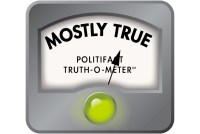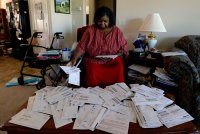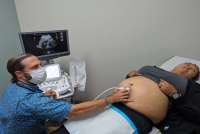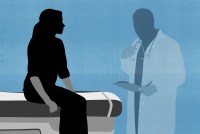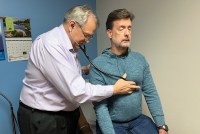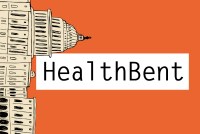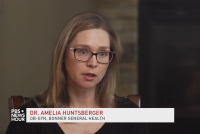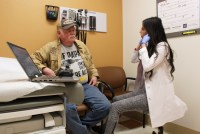Latest KFF Health News Stories
The Shrinking Number of Primary Care Physicians Is Reaching a Tipping Point
The declining share of U.S. doctors in adult primary care is about 25% — a point beyond which many Americans won’t be able to find a family doctor at all.
California’s Medical Board Can’t Pay Its Bills, but Doctors Resist Proposed Fixes
Patient advocates have long alleged the Medical Board of California is ineffective at policing doctors. But a proposal to beef up its budget and overhaul procedures faces stiff resistance from the doctors’ lobby.
Médicos son reacios a preguntar el estatus migratorio de pacientes, a pesar de nueva ley de Florida
Médicos, enfermeras y expertos en política sanitaria afirman que la ley ataca a personas marginadas que ya tienen dificultades para navegar el sistema de salud y que les disuadirá aún más de buscar ayuda médica.
Doctors Hesitate to Ask About Patients’ Immigration Status Despite New Florida Law
Florida’s new immigration law requires hospitals to ask patients about their immigration status at admission and in emergency rooms, and report that information plus the cost of care for residents without legal status. Doctors and nurses who oppose the policy seem reluctant to criticize lawmakers for fear of political retribution.
Sen. Sanders Says Millions of People Can’t Find a Doctor. He’s Mostly Right.
The Vermont senator sees beefing up the primary care workforce as a critical step in expanding Americans’ access to health care.
In Wisconsin, Women’s Health Care Is Constricted by an 1849 Law. These Doctors Are Aghast.
From the front lines of Wisconsin’s abortion battle, obstetricians describe patients who cannot comprehend having to carry nonviable pregnancies. And only one pharmacist in town can be found who will fill prescriptions for abortion pills.
Medical Debt Is Making Americans Angry. Doctors and Hospitals Ignore This at Their Peril.
Doctors and hospitals hold an exalted position in American life, retaining public confidence even as other institutions such as government, law enforcement, and the media are losing people’s trust. But with health care debt out of hand, medical providers risk their good standing.
Doctors Created a Primary Care Clinic as Their Former Hospital Struggled
With the community’s help, former co-workers came together to fill gaps in care left by the loss of doctors and departments at a Gallup, New Mexico, hospital.
La atención primaria está cambiando: el acceso y la calidad están en juego
Una relación sólida y duradera con un médico de atención primaria —que conozca el historial del paciente y pueda vigilar nuevos problemas— se ha considerado durante mucho tiempo la base de un sistema sanitario de calidad.
Will the Doctor See You Now? The Health System’s Changing Landscape
The “front door” to the health system is changing, under pressure from increased demand, consolidation, and changing patient expectations.
Journalists Cover Air Quality, Tick Risks, and … Brazilian Butt Lifts?
KFF Health News and California Healthline staff made the rounds on national and local media this week to discuss their stories. Here’s a collection of their appearances.
Burnout Threatens Primary Care Workforce and Doctors’ Mental Health
Burnout is a widespread problem in the health care industry. Although the pandemic made things worse, burnout among doctors is a long-standing concern that health systems have become more focused on as they try to stop doctors from quitting or retiring early.
As Fewer MDs Practice Rural Primary Care, a Different Type of Doctor Helps Take Up the Slack
The number of DOs is surging, and more than half of them practice in primary care, including in rural areas hit hard by doctor shortages.
Abortion Bans Are Driving Off Doctors and Closing Clinics, Putting Basic Health Care at Risk
Doctors say they are reluctant to practice in abortion-banned states, where making the best decision for a patient could run afoul of the law. Even former President Donald Trump’s surgeon general is concerned about the repercussions for women’s health, writes KFF Health News’ chief Washington correspondent, Julie Rovner.
Las empresas quieren que sus IA tomen notas para los médicos y ofrezcan una segunda opinión, suponiendo que puedan evitar que divulgue la información privada de los pacientes.
ER Doctors Vow to Pursue Case Against Envision Despite Bankruptcy
The lawyer for an emergency physicians group says its lawsuit against Envision Healthcare should be allowed to proceed even though the company has filed for Chapter 11 protection.
AI May Be on Its Way to Your Doctor’s Office, But It’s Not Ready to See Patients
Giant corporations like Microsoft and Google, plus many startups, are eyeing health care profits from programs based on artificial intelligence.
After Idaho’s Strict Abortion Ban, OB-GYNs Stage a Quick Exodus
At least two Idaho hospitals are ending labor and delivery services, with one citing the state’s “legal and political climate” and noting that “recruiting replacements will be extraordinarily difficult” as doctors leave.
Falta de doctores y residencias médicas impactan en la salud de las zonas rurales
Expertos dicen que los factores sistémicos son barreras comunes para establecer y mantener programas de capacitación para médicos en las zonas rurales de Estados Unidos.
Doctor Shortages Distress Rural America, Where Few Residency Programs Exist
Patients in rural northeastern Nevada soon will have fewer providers and resources, after a local hospital decided to close its medical residency program. Nationally, the number of rural residency slots has grown during the past few years but still makes up just 2% of programs and residents nationwide.






